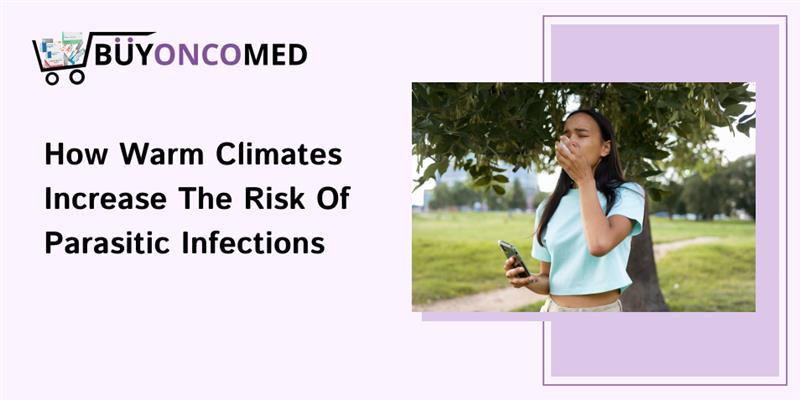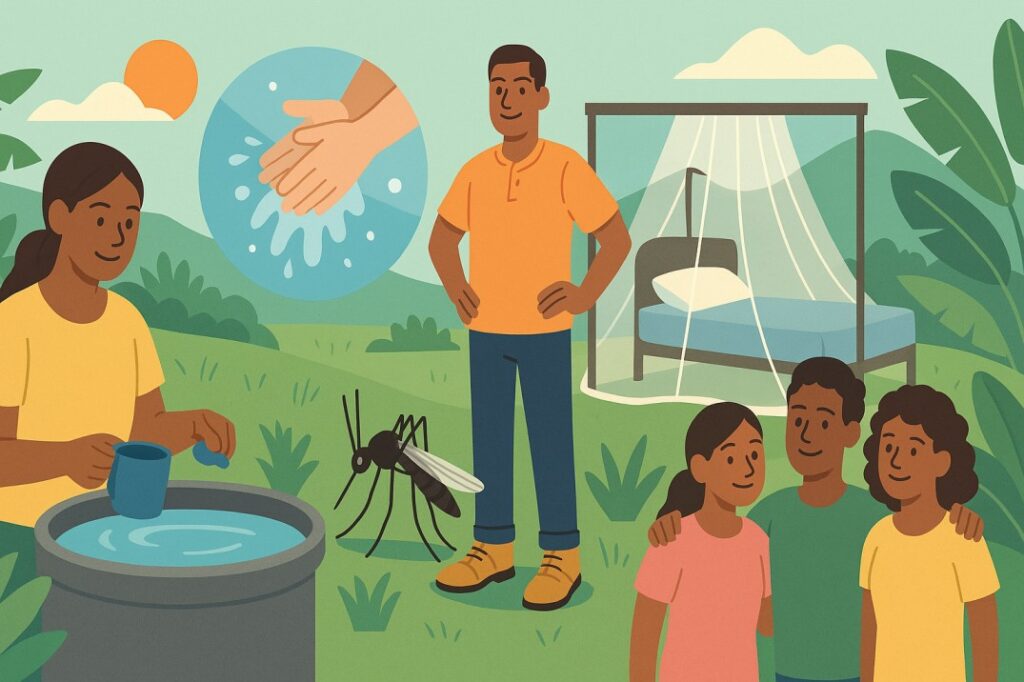
You know how people joke about “catching bugs” in summer? For some folks, that’s more real than you’d think. Warmer weather doesn’t just mean beach days—it means parasites get an upgrade, too. If you live in a hot place or you’re planning a holiday somewhere sunny, a little know-how can help keep you and your loved ones safe from these tiny, unwanted guests.
Why Do Parasites Like Warm Weather?
➡️ Heat Helps Parasites Grow Faster
Parasitic, like worms and amoebas, love the heat. It’s like their version of a fast-forward button. Their eggs hatch quicker, and they grow up even faster when the temperature rises.
In places like Brazil and Nigeria, doctors see more people with parasitic infections during heat waves. Most of the world’s parasites show up in hot, sticky places.
➡️ Humidity Keeps Parasites Alive
Hot and muggy weather isn’t just sweaty for us; it’s great for parasites. The moisture in the air stops their eggs and larvae from drying out.
When monsoon rains hit places like New York or Lagos, hospitals suddenly get busy with cases of stomach worms and other creepy-crawlies. Local nurses say they often see double the usual number of worm cases after big rainstorms.
Parasitic Are Spreading To New Places
➡️ Warming Weather Means New Neighbors
Partial keywords: Parasitic range, tropical diseases in new areas
As global temperatures rise, parasites are moving in where they couldn’t survive before. There have been malaria cases in places like southern Europe and the southern United States, spots that used to be too cold for these bugs.
For example, highland areas in Ethiopia and Colombia, once safe from malaria, now see more cases as temperatures climb.
➡️ More Water, More Trouble
Hotter days bring more people to pools and rivers, and parasites tag along, too. Germs like Cryptosporidium and Giardia do well in warm, wet environments.
When summer kicks in, clinics in cities like Miami to California treat more folks for diarrhea and stomach cramps. Most times, it’s from swimming in untreated water or drinking from unfiltered sources.
Meet the Parasites That Love The Heat
➡️ Soil Worms: Sneaky And Common
If you’ve ever seen kids running barefoot outside in a warm, rainy place, you know they’re having fun. But in some places, that means a higher chance of getting worms.
Eggs from roundworms and hookworms live in soil and sneak in through bare feet or dirty hands.
➡️ Amoebas And Water Bugs
The “brain-eating amoeba” isn’t a myth, though it’s very rare. It can live in warm rivers and lakes in the southern US and Australia. Kids who jump in and get water up their noses are at risk.
Other parasites like Giardia are more common and often turn up after floods or when the water system isn’t clean.
➡️ Bugs That Bite: Mosquitoes And Sandflies
Mosquitoes and sandflies like it hot and wet, just like parasites do. They pick up germs like malaria and leishmaniasis and pass them to people when they bite.
In big cities like New York and Lagos, malaria cases spike after heavy rains because mosquitoes have more places to lay eggs.
| Name | Tablet | Price | Shop Here |
| Biltree 600 | 100 tablet/s | $122.00 | Buy Now |
| Wormentel 444 | 90 tablet/s | $75.00 | Buy Now |
| Bandy Plus 12 Mg | 60 tablet/s | $95.00 | Buy Now |
| ABD 400 | 150 Tablets + 50 Free | $164.00 | Buy Now |
What Happens If You Get A Parasite?
➡️ Tummy Troubles And Tiredness
Most worms cause stomach aches and diarrhea. Kids may feel tired, cranky, or have trouble growing and learning. In Cambodia and Nigeria, doctors say up to 40% of kids with anemia (low iron) have worms to blame.
➡️ Rare But Serious: Brain Infections
Some parasites can go to the brain and cause severe illness. That “brain-eating amoeba” can lead to deadly swelling in just a few days. If you or your kids get a stiff neck, fever, and confusion after swimming in warm water, get help right away.
➡️ Skin Problems And Sores
Leishmaniasis (from sandflies) causes painful skin ulcers and fevers. It’s spreading in parts of Europe as well as in South Asia and Latin America.
How To Protect Yourself In Warm, Humid Places

➡️ Clean Water, Clean Hands
Washing your hands and drinking safe water are simple but powerful ways to avoid parasites. In the UK and the USA, giving families basic water filters dropped parasite infections by half.
➡️ Shoes And Nets Are Lifesavers
Put shoes on kids when they play outside, and use mosquito nets at night. Local health projects in Uganda and Thailand give out free nets, and people get sick less often.
➡️ Team Up: Community Matters
Communities that run regular deworming days in schools or build better toilets see fewer infections. In southern India, schools that gave kids worm medicine saw better attendance and higher test scores.
What’s Next For Parasites And Warm Weather?
Scientists say more places will become “parasite-friendly” in the coming years. Urban growth, changing rainfall, and travel mean we’ll see “tropical” infections in places that never had them before.
Health officials in the US, Italy, and China are keeping a close watch on diseases that used to be far away.
Frequently Asked Questions
1. Are Parasites Moving To New Places?
Yes—they’re following the heat! Malaria and other diseases are popping up in places like southern Europe and the Midwest US.
2. How Can I Stay Safe?
Wash your hands, drink clean water, wear shoes, and use bed nets. Teach your kids these habits, too.
3. Should I Be Worried About All The Parasites?
Most are treatable if you catch them early. A few are dangerous, but serious cases are rare.
4. What About My Town?
If you live somewhere hot and rainy or near rivers and lakes, keep an eye out. Check with local clinics about outbreaks.
Share What You Know
You can help stop Parasitic Infections by spreading the word. Share these tips with your friends, family, and neighbors. If you run a school or business, make hygiene part of your daily routine.

